- Home
- Joseph Conrad
Tales of Unrest Page 6
Tales of Unrest Read online
Page 6
THE LAGOON
The white man, leaning with both arms over the roof of the little housein the stern of the boat, said to the steersman--
"We will pass the night in Arsat's clearing. It is late."
The Malay only grunted, and went on looking fixedly at the river. Thewhite man rested his chin on his crossed arms and gazed at the wakeof the boat. At the end of the straight avenue of forests cut by theintense glitter of the river, the sun appeared unclouded and dazzling,poised low over the water that shone smoothly like a band of metal. Theforests, sombre and dull, stood motionless and silent on each side ofthe broad stream. At the foot of big, towering trees, trunkless nipapalms rose from the mud of the bank, in bunches of leaves enormousand heavy, that hung unstirring over the brown swirl of eddies. In thestillness of the air every tree, every leaf, every bough, every tendrilof creeper and every petal of minute blossoms seemed to have beenbewitched into an immobility perfect and final. Nothing moved onthe river but the eight paddles that rose flashing regularly, dippedtogether with a single splash; while the steersman swept right and leftwith a periodic and sudden flourish of his blade describing a glintingsemicircle above his head. The churned-up water frothed alongside witha confused murmur. And the white man's canoe, advancing upstream in theshort-lived disturbance of its own making, seemed to enter the portalsof a land from which the very memory of motion had forever departed.
The white man, turning his back upon the setting sun, looked along theempty and broad expanse of the sea-reach. For the last three miles ofits course the wandering, hesitating river, as if enticed irresistiblyby the freedom of an open horizon, flows straight into the sea, flowsstraight to the east--to the east that harbours both light and darkness.Astern of the boat the repeated call of some bird, a cry discordant andfeeble, skipped along over the smooth water and lost itself, before itcould reach the other shore, in the breathless silence of the world.
The steersman dug his paddle into the stream, and held hard withstiffened arms, his body thrown forward. The water gurgled aloud; andsuddenly the long straight reach seemed to pivot on its centre, theforests swung in a semicircle, and the slanting beams of sunset touchedthe broadside of the canoe with a fiery glow, throwing the slender anddistorted shadows of its crew upon the streaked glitter of the river.The white man turned to look ahead. The course of the boat had beenaltered at right-angles to the stream, and the carved dragon-head of itsprow was pointing now at a gap in the fringing bushes of the bank. Itglided through, brushing the overhanging twigs, and disappeared from theriver like some slim and amphibious creature leaving the water for itslair in the forests.
The narrow creek was like a ditch: tortuous, fabulously deep; filledwith gloom under the thin strip of pure and shining blue of the heaven.Immense trees soared up, invisible behind the festooned draperies ofcreepers. Here and there, near the glistening blackness of the water,a twisted root of some tall tree showed amongst the tracery of smallferns, black and dull, writhing and motionless, like an arrested snake.The short words of the paddlers reverberated loudly between the thickand sombre walls of vegetation. Darkness oozed out from between thetrees, through the tangled maze of the creepers, from behind thegreat fantastic and unstirring leaves; the darkness, mysterious andinvincible; the darkness scented and poisonous of impenetrable forests.
The men poled in the shoaling water. The creek broadened, opening outinto a wide sweep of a stagnant lagoon. The forests receded from themarshy bank, leaving a level strip of bright green, reedy grass to framethe reflected blueness of the sky. A fleecy pink cloud drifted highabove, trailing the delicate colouring of its image under the floatingleaves and the silvery blossoms of the lotus. A little house, perchedon high piles, appeared black in the distance. Near it, two tall nibongpalms, that seemed to have come out of the forests in the background,leaned slightly over the ragged roof, with a suggestion of sadtenderness and care in the droop of their leafy and soaring heads.
The steersman, pointing with his paddle, said, "Arsat is there. I seehis canoe fast between the piles."
The polers ran along the sides of the boat glancing over their shouldersat the end of the day's journey. They would have preferred to spend thenight somewhere else than on this lagoon of weird aspect and ghostlyreputation. Moreover, they disliked Arsat, first as a stranger, and alsobecause he who repairs a ruined house, and dwells in it, proclaimsthat he is not afraid to live amongst the spirits that haunt the placesabandoned by mankind. Such a man can disturb the course of fate byglances or words; while his familiar ghosts are not easy to propitiateby casual wayfarers upon whom they long to wreak the malice of theirhuman master. White men care not for such things, being unbelievers andin league with the Father of Evil, who leads them unharmed through theinvisible dangers of this world. To the warnings of the righteous theyoppose an offensive pretence of disbelief. What is there to be done?
So they thought, throwing their weight on the end of their long poles.The big canoe glided on swiftly, noiselessly, and smoothly, towardsArsat's clearing, till, in a great rattling of poles thrown down, andthe loud murmurs of "Allah be praised!" it came with a gentle knockagainst the crooked piles below the house.
The boatmen with uplifted faces shouted discordantly, "Arsat! O Arsat!"Nobody came. The white man began to climb the rude ladder giving accessto the bamboo platform before the house. The juragan of the boat saidsulkily, "We will cook in the sampan, and sleep on the water."
"Pass my blankets and the basket," said the white man, curtly.
He knelt on the edge of the platform to receive the bundle. Then theboat shoved off, and the white man, standing up, confronted Arsat,who had come out through the low door of his hut. He was a man young,powerful, with broad chest and muscular arms. He had nothing on buthis sarong. His head was bare. His big, soft eyes stared eagerly atthe white man, but his voice and demeanour were composed as he asked,without any words of greeting--
"Have you medicine, Tuan?"
"No," said the visitor in a startled tone. "No. Why? Is there sicknessin the house?"
"Enter and see," replied Arsat, in the same calm manner, and turningshort round, passed again through the small doorway. The white man,dropping his bundles, followed.
In the dim light of the dwelling he made out on a couch of bamboos awoman stretched on her back under a broad sheet of red cotton cloth.She lay still, as if dead; but her big eyes, wide open, glittered in thegloom, staring upwards at the slender rafters, motionless and unseeing.She was in a high fever, and evidently unconscious. Her cheeks were sunkslightly, her lips were partly open, and on the young face there was theominous and fixed expression--the absorbed, contemplating expression ofthe unconscious who are going to die. The two men stood looking down ather in silence.
"Has she been long ill?" asked the traveller.
"I have not slept for five nights," answered the Malay, in a deliberatetone. "At first she heard voices calling her from the water andstruggled against me who held her. But since the sun of to-day rose shehears nothing--she hears not me. She sees nothing. She sees not me--me!"
He remained silent for a minute, then asked softly--
"Tuan, will she die?"
"I fear so," said the white man, sorrowfully. He had known Arsat yearsago, in a far country in times of trouble and danger, when no friendshipis to be despised. And since his Malay friend had come unexpectedly todwell in the hut on the lagoon with a strange woman, he had slept manytimes there, in his journeys up and down the river. He liked the man whoknew how to keep faith in council and how to fight without fear by theside of his white friend. He liked him--not so much perhaps as a manlikes his favourite dog--but still he liked him well enough to help andask no questions, to think sometimes vaguely and hazily in the midst ofhis own pursuits, about the lonely man and the long-haired woman withaudacious face and triumphant eyes, who lived together hidden by theforests--alone and feared.
The white man came out of the hut in time to see the enormousconflagration of sunset put out by the swift and s
tealthy shadows that,rising like a black and impalpable vapour above the tree-tops, spreadover the heaven, extinguishing the crimson glow of floating clouds andthe red brilliance of departing daylight. In a few moments all the starscame out above the intense blackness of the earth and the great lagoongleaming suddenly with reflected lights resembled an oval patch of nightsky flung down into the hopeless and abysmal night of the wilderness.The white man had some supper out of the basket, then collecting afew sticks that lay about the platform, made up a small fire, notfor warmth, but for the sake of the smoke, which would keep off themosquitos. He wrapped himself in the blankets and sat with his backagainst the reed wall of the house, smoking thoughtfully.
Arsat came through the doorway with noiseless steps and squatted down bythe fire. The white man moved his outstretched legs a little.
"She breathes," said Arsat in a low voice, anticipating the expectedquestion. "She breathes and burns as if with a great fire. She speaksnot; she hears not--and burns!"
He paused for a moment, then asked in a quiet, incurious tone--
"Tuan . . . will she die?"
The white man moved his shoulders uneasily and muttered in a hesitatingmanner--
"If such is her fate."
"No, Tuan," said Arsat, calmly. "If such is my fate. I hear, I see,I wait. I remember . . . Tuan, do you remember the old days? Do youremember my brother?"
"Yes," said the white man. The Malay rose suddenly and went in. Theother, sitting still outside, could hear the voice in the hut. Arsatsaid: "Hear me! Speak!" His words were succeeded by a complete silence."O Diamelen!" he cried, suddenly. After that cry there was a deep sigh.Arsat came out and sank down again in his old place.
They sat in silence before the fire. There was no sound within thehouse, there was no sound near them; but far away on the lagoon theycould hear the voices of the boatmen ringing fitful and distinct onthe calm water. The fire in the bows of the sampan shone faintly in thedistance with a hazy red glow. Then it died out. The voices ceased.The land and the water slept invisible, unstirring and mute. It was asthough there had been nothing left in the world but the glitter of starsstreaming, ceaseless and vain, through the black stillness of the night.
The white man gazed straight before him into the darkness with wide-openeyes. The fear and fascination, the inspiration and the wonder ofdeath--of death near, unavoidable, and unseen, soothed the unrest of hisrace and stirred the most indistinct, the most intimate of his thoughts.The ever-ready suspicion of evil, the gnawing suspicion that lurks inour hearts, flowed out into the stillness round him--into the stillnessprofound and dumb, and made it appear untrustworthy and infamous, likethe placid and impenetrable mask of an unjustifiable violence. In thatfleeting and powerful disturbance of his being the earth enfolded inthe starlight peace became a shadowy country of inhuman strife, abattle-field of phantoms terrible and charming, august or ignoble,struggling ardently for the possession of our helpless hearts. Anunquiet and mysterious country of inextinguishable desires and fears.
A plaintive murmur rose in the night; a murmur saddening and startling,as if the great solitudes of surrounding woods had tried to whisperinto his ear the wisdom of their immense and lofty indifference. Soundshesitating and vague floated in the air round him, shaped themselvesslowly into words; and at last flowed on gently in a murmuring streamof soft and monotonous sentences. He stirred like a man waking up andchanged his position slightly. Arsat, motionless and shadowy, sittingwith bowed head under the stars, was speaking in a low and dreamy tone--
". . . for where can we lay down the heaviness of our trouble but ina friend's heart? A man must speak of war and of love. You, Tuan, knowwhat war is, and you have seen me in time of danger seek death as othermen seek life! A writing may be lost; a lie may be written; but what theeye has seen is truth and remains in the mind!"
"I remember," said the white man, quietly. Arsat went on with mournfulcomposure--
"Therefore I shall speak to you of love. Speak in the night. Speakbefore both night and love are gone--and the eye of day looks upon mysorrow and my shame; upon my blackened face; upon my burnt-up heart."
A sigh, short and faint, marked an almost imperceptible pause, and thenhis words flowed on, without a stir, without a gesture.
"After the time of trouble and war was over and you went away from mycountry in the pursuit of your desires, which we, men of the islands,cannot understand, I and my brother became again, as we had beenbefore, the sword-bearers of the Ruler. You know we were men of family,belonging to a ruling race, and more fit than any to carry on our rightshoulder the emblem of power. And in the time of prosperity Si Dendringshowed us favour, as we, in time of sorrow, had showed to him thefaithfulness of our courage. It was a time of peace. A time ofdeer-hunts and cock-fights; of idle talks and foolish squabbles betweenmen whose bellies are full and weapons are rusty. But the sower watchedthe young rice-shoots grow up without fear, and the traders came andwent, departed lean and returned fat into the river of peace. Theybrought news, too. Brought lies and truth mixed together, so that no manknew when to rejoice and when to be sorry. We heard from them about youalso. They had seen you here and had seen you there. And I was glad tohear, for I remembered the stirring times, and I always remembered you,Tuan, till the time came when my eyes could see nothing in the past,because they had looked upon the one who is dying there--in the house."
He stopped to exclaim in an intense whisper, "O Mara bahia! O Calamity!"then went on speaking a little louder:
"There's no worse enemy and no better friend than a brother, Tuan, forone brother knows another, and in perfect knowledge is strength for goodor evil. I loved my brother. I went to him and told him that I could seenothing but one face, hear nothing but one voice. He told me: 'Open yourheart so that she can see what is in it--and wait. Patience is wisdom.Inchi Midah may die or our Ruler may throw off his fear of a woman!'. . . I waited! . . . You remember the lady with the veiled face, Tuan, andthe fear of our Ruler before her cunning and temper. And if she wantedher servant, what could I do? But I fed the hunger of my heart on shortglances and stealthy words. I loitered on the path to the bath-houses inthe daytime, and when the sun had fallen behind the forest I crept alongthe jasmine hedges of the women's courtyard. Unseeing, we spoke toone another through the scent of flowers, through the veil of leaves,through the blades of long grass that stood still before our lips; sogreat was our prudence, so faint was the murmur of our great longing.The time passed swiftly . . . and there were whispers amongst women--andour enemies watched--my brother was gloomy, and I began to think ofkilling and of a fierce death. . . . We are of a people who take whatthey want--like you whites. There is a time when a man should forgetloyalty and respect. Might and authority are given to rulers, but to allmen is given love and strength and courage. My brother said, 'You shalltake her from their midst. We are two who are like one.' And I answered,'Let it be soon, for I find no warmth in sunlight that does not shineupon her.' Our time came when the Ruler and all the great people wentto the mouth of the river to fish by torchlight. There were hundredsof boats, and on the white sand, between the water and the forests,dwellings of leaves were built for the households of the Rajahs. Thesmoke of cooking-fires was like a blue mist of the evening, and manyvoices rang in it joyfully. While they were making the boats ready tobeat up the fish, my brother came to me and said, 'To-night!' I lookedto my weapons, and when the time came our canoe took its place in thecircle of boats carrying the torches. The lights blazed on the water,but behind the boats there was darkness. When the shouting began and theexcitement made them like mad we dropped out. The water swallowed ourfire, and we floated back to the shore that was dark with only hereand there the glimmer of embers. We could hear the talk of slave-girlsamongst the sheds. Then we found a place deserted and silent. We waitedthere. She came. She came running along the shore, rapid and leavingno trace, like a leaf driven by the wind into the sea. My brother saidgloomily, 'Go and take her; carry her into our boat.' I lifted her inmy arms. She pant
ed. Her heart was beating against my breast. I said, 'Itake you from those people. You came to the cry of my heart, but my armstake you into my boat against the will of the great!' 'It is right,'said my brother. 'We are men who take what we want and can hold itagainst many. We should have taken her in daylight.' I said, 'Let us beoff'; for since she was in my boat I began to think of our Ruler's manymen. 'Yes. Let us be off,' said my brother. 'We are cast out and thisboat is our country now--and the sea is our refuge.' He lingered withhis foot on the shore, and I entreated him to hasten, for I rememberedthe strokes of her heart against my breast and thought that two mencannot withstand a hundred. We left, paddling downstream close to thebank; and as we passed by the creek where they were fishing, the greatshouting had ceased, but the murmur of voices was loud like the hummingof insects flying at noonday. The boats floated, clustered together, inthe red light of torches, under a black roof of smoke; and men talked oftheir sport. Men that boasted, and praised, and jeered--men that wouldhave been our friends in the morning, but on that night were already ourenemies. We paddled swiftly past. We had no more friends in the countryof our birth. She sat in the middle of the canoe with covered face;silent as she is now; unseeing as she is now--and I had no regret atwhat I was leaving because I could hear her breathing close to me--as Ican hear her now."
He paused, listened with his ear turned to the doorway, then shook hishead and went on:
"My brother wanted to shout the cry of challenge--one cry only--to letthe people know we were freeborn robbers who trusted our arms and thegreat sea. And again I begged him in the name of our love to be silent.Could I not hear her breathing close to me? I knew the pursuit wouldcome quick enough. My brother loved me. He dipped his paddle without asplash. He only said, 'There is half a man in you now--the other half isin that woman. I can wait. When you are a whole man again, you will comeback with me here to shout defiance. We are sons of the same mother.' Imade no answer. All my strength and all my spirit were in my hands thatheld the paddle--for I longed to be with her in a safe place beyond thereach of men's anger and of women's spite. My love was so great, thatI thought it could guide me to a country where death was unknown, if Icould only escape from Inchi Midah's fury and from our Ruler's sword.We paddled with haste, breathing through our teeth. The blades bit deepinto the smooth water. We passed out of the river; we flew in clearchannels amongst the shallows. We skirted the black coast; we skirtedthe sand beaches where the sea speaks in whispers to the land; and thegleam of white sand flashed back past our boat, so swiftly she ran uponthe water. We spoke not. Only once I said, 'Sleep, Diamelen, for soonyou may want all your strength.' I heard the sweetness of her voice, butI never turned my head. The sun rose and still we went on. Water fellfrom my face like rain from a cloud. We flew in the light and heat. Inever looked back, but I knew that my brother's eyes, behind me, werelooking steadily ahead, for the boat went as straight as a bushman'sdart, when it leaves the end of the sumpitan. There was no betterpaddler, no better steersman than my brother. Many times, together, wehad won races in that canoe. But we never had put out our strength as wedid then--then, when for the last time we paddled together! There was nobraver or stronger man in our country than my brother. I could not sparethe strength to turn my head and look at him, but every moment I heardthe hiss of his breath getting louder behind me. Still he did not speak.The sun was high. The heat clung to my back like a flame of fire. Myribs were ready to burst, but I could no longer get enough air intomy chest. And then I felt I must cry out with my last breath, 'Let usrest!' . . . 'Good!' he answered; and his voice was firm. He was strong.He was brave. He knew not fear and no fatigue . . . My brother!"
A murmur powerful and gentle, a murmur vast and faint; the murmur oftrembling leaves, of stirring boughs, ran through the tangled depths ofthe forests, ran over the starry smoothness of the lagoon, and the waterbetween the piles lapped the slimy timber once with a sudden splash.A breath of warm air touched the two men's faces and passed on witha mournful sound--a breath loud and short like an uneasy sigh of thedreaming earth.
Arsat went on in an even, low voice.
"We ran our canoe on the white beach of a little bay close to a longtongue of land that seemed to bar our road; a long wooded cape going farinto the sea. My brother knew that place. Beyond the cape a river hasits entrance, and through the jungle of that land there is a narrowpath. We made a fire and cooked rice. Then we lay down to sleep on thesoft sand in the shade of our canoe, while she watched. No sooner had Iclosed my eyes than I heard her cry of alarm. We leaped up. The sun washalfway down the sky already, and coming in sight in the opening of thebay we saw a prau manned by many paddlers. We knew it at once; it wasone of our Rajah's praus. They were watching the shore, and saw us. Theybeat the gong, and turned the head of the prau into the bay. I felt myheart become weak within my breast. Diamelen sat on the sand and coveredher face. There was no escape by sea. My brother laughed. He had thegun you had given him, Tuan, before you went away, but there was only ahandful of powder. He spoke to me quickly: 'Run with her along the path.I shall keep them back, for they have no firearms, and landing in theface of a man with a gun is certain death for some. Run with her. On theother side of that wood there is a fisherman's house--and a canoe.When I have fired all the shots I will follow. I am a great runner, andbefore they can come up we shall be gone. I will hold out as long as Ican, for she is but a woman--that can neither run nor fight, but she hasyour heart in her weak hands.' He dropped behind the canoe. The prau wascoming. She and I ran, and as we rushed along the path I heard shots.My brother fired--once--twice--and the booming of the gong ceased. Therewas silence behind us. That neck of land is narrow. Before I heard mybrother fire the third shot I saw the shelving shore, and I saw thewater again; the mouth of a broad river. We crossed a grassy glade. Weran down to the water. I saw a low hut above the black mud, and a smallcanoe hauled up. I heard another shot behind me. I thought, 'That is hislast charge.' We rushed down to the canoe; a man came running from thehut, but I leaped on him, and we rolled together in the mud. Then I gotup, and he lay still at my feet. I don't know whether I had killed himor not. I and Diamelen pushed the canoe afloat. I heard yells behind me,and I saw my brother run across the glade. Many men were bounding afterhim, I took her in my arms and threw her into the boat, then leaped inmyself. When I looked back I saw that my brother had fallen. He felland was up again, but the men were closing round him. He shouted, 'I amcoming!' The men were close to him. I looked. Many men. Then I lookedat her. Tuan, I pushed the canoe! I pushed it into deep water. She waskneeling forward looking at me, and I said, 'Take your paddle,' whileI struck the water with mine. Tuan, I heard him cry. I heard him cry myname twice; and I heard voices shouting, 'Kill! Strike!' I never turnedback. I heard him calling my name again with a great shriek, as whenlife is going out together with the voice--and I never turned my head.My own name! . . . My brother! Three times he called--but I was notafraid of life. Was she not there in that canoe? And could I not withher find a country where death is forgotten--where death is unknown!"
The white man sat up. Arsat rose and stood, an indistinct and silentfigure above the dying embers of the fire. Over the lagoon a mistdrifting and low had crept, erasing slowly the glittering images ofthe stars. And now a great expanse of white vapour covered the land: itflowed cold and gray in the darkness, eddied in noiseless whirls roundthe tree-trunks and about the platform of the house, which seemed tofloat upon a restless and impalpable illusion of a sea. Only far awaythe tops of the trees stood outlined on the twinkle of heaven, like asombre and forbidding shore--a coast deceptive, pitiless and black.
Arsat's voice vibrated loudly in the profound peace.
"I had her there! I had her! To get her I would have faced all mankind.But I had her--and--"
His words went out ringing into the empty distances. He paused, andseemed to listen to them dying away very far--beyond help and beyondrecall. Then he said quietly--
"Tuan, I loved my brother."
A breath
of wind made him shiver. High above his head, high above thesilent sea of mist the drooping leaves of the palms rattled togetherwith a mournful and expiring sound. The white man stretched his legs.His chin rested on his chest, and he murmured sadly without lifting hishead--
"We all love our brothers."
Arsat burst out with an intense whispering violence--
"What did I care who died? I wanted peace in my own heart."
He seemed to hear a stir in the house--listened--then stepped innoiselessly. The white man stood up. A breeze was coming in fitfulpuffs. The stars shone paler as if they had retreated into the frozendepths of immense space. After a chill gust of wind there were a fewseconds of perfect calm and absolute silence. Then from behind the blackand wavy line of the forests a column of golden light shot up into theheavens and spread over the semicircle of the eastern horizon. The sunhad risen. The mist lifted, broke into drifting patches, vanished intothin flying wreaths; and the unveiled lagoon lay, polished and black, inthe heavy shadows at the foot of the wall of trees. A white eagle roseover it with a slanting and ponderous flight, reached the clear sunshineand appeared dazzlingly brilliant for a moment, then soaring higher,became a dark and motionless speck before it vanished into the blue asif it had left the earth forever. The white man, standing gazing upwardsbefore the doorway, heard in the hut a confused and broken murmur ofdistracted words ending with a loud groan. Suddenly Arsat stumbled outwith outstretched hands, shivered, and stood still for some time withfixed eyes. Then he said--
"She burns no more."
Before his face the sun showed its edge above the tree-tops risingsteadily. The breeze freshened; a great brilliance burst upon thelagoon, sparkled on the rippling water. The forests came out of theclear shadows of the morning, became distinct, as if they had rushednearer--to stop short in a great stir of leaves, of nodding boughs, ofswaying branches. In the merciless sunshine the whisper of unconsciouslife grew louder, speaking in an incomprehensible voice round the dumbdarkness of that human sorrow. Arsat's eyes wandered slowly, then staredat the rising sun.
"I can see nothing," he said half aloud to himself.
"There is nothing," said the white man, moving to the edge of theplatform and waving his hand to his boat. A shout came faintly over thelagoon and the sampan began to glide towards the abode of the friend ofghosts.
"If you want to come with me, I will wait all the morning," said thewhite man, looking away upon the water.
"No, Tuan," said Arsat, softly. "I shall not eat or sleep in this house,but I must first see my road. Now I can see nothing--see nothing! Thereis no light and no peace in the world; but there is death--death formany. We are sons of the same mother--and I left him in the midst ofenemies; but I am going back now."
He drew a long breath and went on in a dreamy tone:
"In a little while I shall see clear enough to strike--to strike. Butshe has died, and . . . now . . . darkness."
He flung his arms wide open, let them fall along his body, then stoodstill with unmoved face and stony eyes, staring at the sun. The whiteman got down into his canoe. The polers ran smartly along the sidesof the boat, looking over their shoulders at the beginning of a wearyjourney. High in the stern, his head muffled up in white rags, thejuragan sat moody, letting his paddle trail in the water. The white man,leaning with both arms over the grass roof of the little cabin, lookedback at the shining ripple of the boat's wake. Before the sampan passedout of the lagoon into the creek he lifted his eyes. Arsat had notmoved. He stood lonely in the searching sunshine; and he looked beyondthe great light of a cloudless day into the darkness of a world ofillusions.

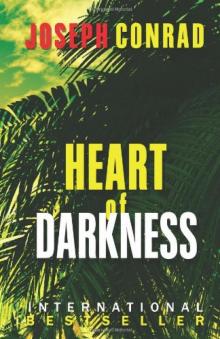 Heart of Darkness
Heart of Darkness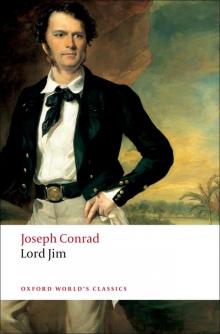 Lord Jim
Lord Jim The Nigger of the Narcissus (Echo Library)
The Nigger of the Narcissus (Echo Library) Victory (Dover Thrift Editions)
Victory (Dover Thrift Editions) Secret Agent
Secret Agent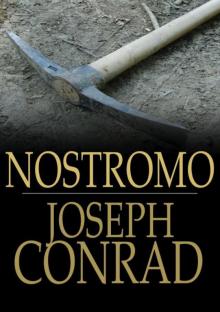 Nostromo
Nostromo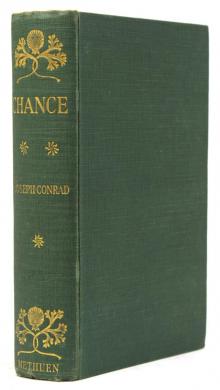 Chance: A Tale in Two Parts
Chance: A Tale in Two Parts Youth
Youth Almayer's Folly
Almayer's Folly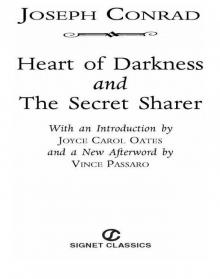 The Heart of Darkness and the Secret Sharer
The Heart of Darkness and the Secret Sharer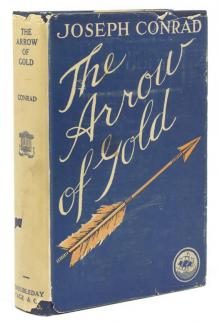 The Arrow of Gold: A Story Between Two Notes
The Arrow of Gold: A Story Between Two Notes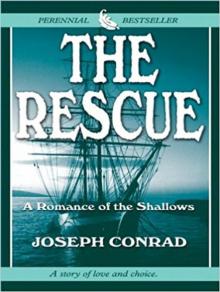 The Rescue: A Romance of the Shallows
The Rescue: A Romance of the Shallows The Point Of Honor: A Military Tale
The Point Of Honor: A Military Tale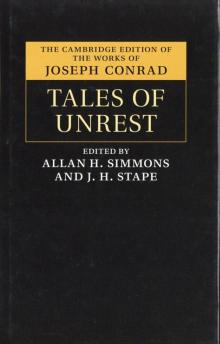 Tales of Unrest
Tales of Unrest Under Western Eyes
Under Western Eyes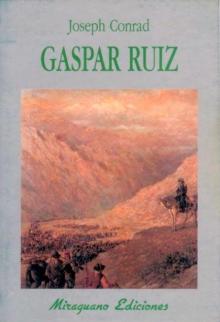 Gaspar Ruiz
Gaspar Ruiz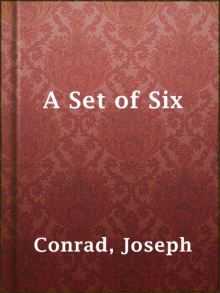 A Set of Six
A Set of Six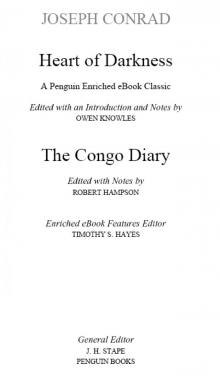 Heart of Darkness and the Congo Diary (Penguin Classics)
Heart of Darkness and the Congo Diary (Penguin Classics)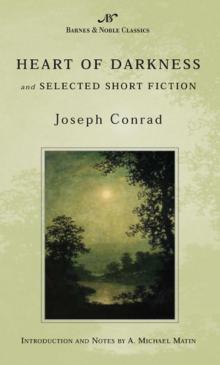 Heart of Darkness and Selected Short Fiction
Heart of Darkness and Selected Short Fiction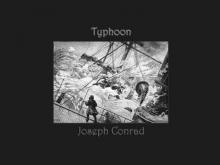 Typhoon
Typhoon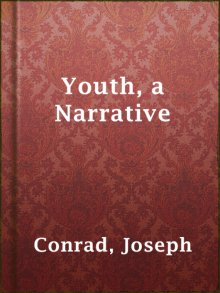 Youth, a Narrative
Youth, a Narrative Tomorrow
Tomorrow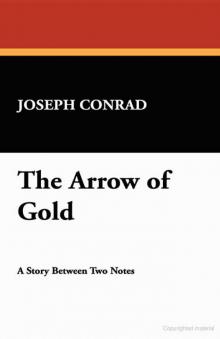 The Arrow of Gold
The Arrow of Gold The Shadow Line: A Confession
The Shadow Line: A Confession The Rescue
The Rescue Victory (Echo Library)
Victory (Echo Library) The Brute
The Brute Romance
Romance A Personal Record
A Personal Record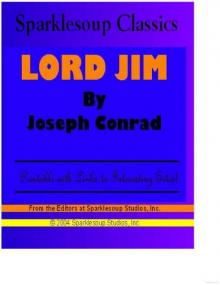 Lord Jim: A Tale
Lord Jim: A Tale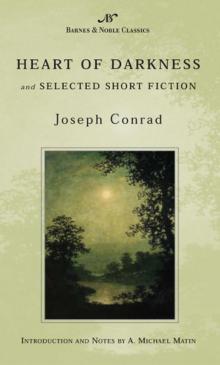 Heart of Darkness and Selected Short Fiction (Barnes & Noble Classics Series)
Heart of Darkness and Selected Short Fiction (Barnes & Noble Classics Series) Within the Tides
Within the Tides The Secret Sharer and Other Stories
The Secret Sharer and Other Stories Falk
Falk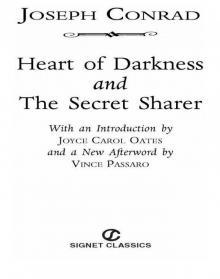 Heart of Darkness and The Secret Sharer
Heart of Darkness and The Secret Sharer Chance
Chance An Anarchist
An Anarchist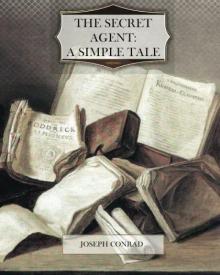 The Secret Agent: A Simple Tale
The Secret Agent: A Simple Tale The Secret Agent
The Secret Agent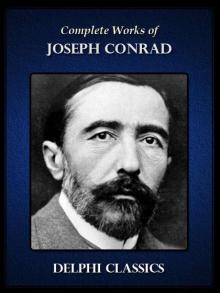 Complete Works of Joseph Conrad (Illustrated)
Complete Works of Joseph Conrad (Illustrated)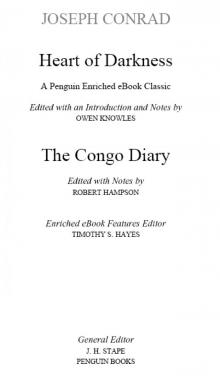 Heart of Darkness and the Congo Diary
Heart of Darkness and the Congo Diary Notes on Life & Letters
Notes on Life & Letters Typhoon (Single Story)
Typhoon (Single Story)